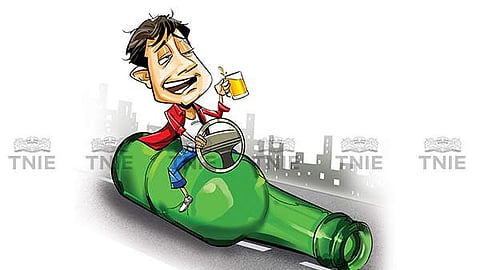

There are certain government notices which are predictable and issued at a particular time of the year. Like every year with autumn approaching an end, we see a clutter of environment related notices on how to control pollution. As the I-Day and Republic Day approach, we see wanted pictures of terrorists. In 1980s, they were Sikh militants whose pictures with time got replaced with Islamic terror mongers.
Similarly a month before Diwali, again the media space would be flooded with notices banning sale of crackers to save the air quality. There would also be inane discussions on using green crackers, whatever they mean. Despite the ban, crackers are burst, despite the notices pollution takes grip of the city and the wanted terrorist lists continue to remain in circulation.
With the Christmas and New Year approaching, celebrations are in the air. Celebrations in Delhi generally boils down to annihilation of poultry birds and bumper sale of alcohol.With this backdrop comes the notices every year trying to curb the sale of liquor.
One such notice was issued last week stating that hotels, clubs, and restaurants are directed to verify the age of their customers through physical government-issued identity proofs. This notification, the statement said, followed the detection of multiple violations of the legal drinking age norm during recent inspections by the excise department.
Delhi mandates a minimum drinking age of 25 years. However, inspections revealed instances of underage individuals consuming alcohol. Complaints were also lodged against certain establishments for serving liquor to underage patrons.Will this notification, dutifully carried by all the newspapers in bold letters have any effect in checking New Year eve hooliganism?
This was unlikely given the fact that the city government had brought a few years back a most dubious excise policy which in nutshell amounted to sale of liquor with the mantra ‘ek ke saath ek free (one bottle free with each bottle bought)’. Delhi is culturally a boisterous city and to control its liquor-propelled revelry, mere notices would not work. It has to be a year round vigil, which doesn’t happen.
The New Year Eve celebrations in the national Capital last year had turned gruesome. In a tragic incident in Kanjhawala, a 20-year-old woman, Anjali Kumari, was killed after being hit by a car and dragged for kilometers under the vehicle. The incident caused public outrage due to the callousness of the accused, who reportedly knew she was stuck beneath their car. Each year, Delhi sees a significant rise in cases of drunk driving on New Year’s Eve. For instance, over 549 cases were recorded in 2023, more than double the previous year.
A paper published on research portal Amikus Qriae, mentions, “While legal drinking ages exist, varying from 18 to 25 across different states, these regulations seem insufficient in curbing the issue. The problem extends beyond legal restrictions. Alcohol, regardless of age, poses significant health risks – impacting physical and mental well-being. It can exacerbate existing conditions, lead to risky behaviour, and negatively affect academic performance, career prospects, and even family relationships.”
The point of concern is that a country which is moving in the direction of one-nation-one-election has not been able to decide on a uniform drinking age, it varies from 18-25 years. Meaning an 18 year old can drink in one state and travel to other which prohibits drinking for an 18 year old.
The paper further adds, “There are no stringent rules and regulations vis-à-vis alcohol consumption by minors. The minor, under the current Indian Law, will not face any kind of penalty or punishment for the consumption of alcohol. There is no nationwide law prevalent for the same either. The Juvenile Justice (Care and Protection of Children) Act, 2015 and legal frameworks of a few states do prohibit the sale and serving of alcohol to minors, however, these frameworks lack stringent enforcement which undermines the value of penalty or punishment associated with it, contributing to the easy availability of liquor and hence helping the trend of unhealthy and illicit alcohol consumption by minors.”
To control hooliganism fuelled by liquor, as the paper states, there has to be a large scale reform in the liquor policy and related laws. The piecemeal notifications did not control pollution, could not ban the bursting of crackers and would fail to end New Year eve rowdy revelry.
Sidharth Mishra
Author and president, Centre for Reforms, Development & Justice